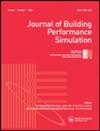针对能源灵活性的空间供热模型预测控制--使用长短期记忆神经网络代理模型和遗传优化算法的案例研究
IF 2.2
4区 工程技术
Q2 CONSTRUCTION & BUILDING TECHNOLOGY
引用次数: 0
摘要
本文章由计算机程序翻译,如有差异,请以英文原文为准。
Model-predictive space heating control for energy flexibility – a case study using a long short-term memory neural network surrogate model and a genetic optimization algorithm
求助全文
通过发布文献求助,成功后即可免费获取论文全文。
去求助
来源期刊

Journal of Building Performance Simulation
CONSTRUCTION & BUILDING TECHNOLOGY-
CiteScore
5.50
自引率
12.00%
发文量
55
审稿时长
12 months
期刊介绍:
The Journal of Building Performance Simulation (JBPS) aims to make a substantial and lasting contribution to the international building community by supporting our authors and the high-quality, original research they submit. The journal also offers a forum for original review papers and researched case studies
We welcome building performance simulation contributions that explore the following topics related to buildings and communities:
-Theoretical aspects related to modelling and simulating the physical processes (thermal, air flow, moisture, lighting, acoustics).
-Theoretical aspects related to modelling and simulating conventional and innovative energy conversion, storage, distribution, and control systems.
-Theoretical aspects related to occupants, weather data, and other boundary conditions.
-Methods and algorithms for optimizing the performance of buildings and communities and the systems which service them, including interaction with the electrical grid.
-Uncertainty, sensitivity analysis, and calibration.
-Methods and algorithms for validating models and for verifying solution methods and tools.
-Development and validation of controls-oriented models that are appropriate for model predictive control and/or automated fault detection and diagnostics.
-Techniques for educating and training tool users.
-Software development techniques and interoperability issues with direct applicability to building performance simulation.
-Case studies involving the application of building performance simulation for any stage of the design, construction, commissioning, operation, or management of buildings and the systems which service them are welcomed if they include validation or aspects that make a novel contribution to the knowledge base.
 求助内容:
求助内容: 应助结果提醒方式:
应助结果提醒方式:


